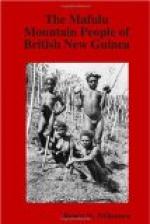I heard nothing to justify the idea of the Mafulu people having any belief in a universal God or All Father; but there is a general belief among them in a mysterious individual named Tsidibe, who may be a man, or may be a spirit (they appear to be vague as to this), who has immense power, and who once passed through their country in a direction from east to west. Wherever you may be, if you speak of this personage, and ask to be told in which direction he travelled, they always point out one which is from east to west. They believe that it was Tsidibe who taught them all their customs, including dancing and manufacture, and that he ultimately reached and remained in the land of the white man, where he is now living; and that the superior knowledge of the white man in manufacture, and especially in the making of clothes, has been acquired from him. The idea of his ultimate association with the white man can hardly, however, be a very ancient tradition. One of the Fathers was seriously asked by a native whether he had ever seen Tsidibe. They seem to think that he is essentially a beneficent being. They regret his having left their country; but they have no doubt as to this, and do not regard him as still continuing to exercise any influence over them and their affairs, have no ceremonies or observances with reference to him, and do not address to him any supplications. As traces of his passage through their country they will show you extraordinarily shaped rocks and stones, such as fragments which have fallen from above into the valley, and rocks and stones which have lodged in strange positions. But there are no ceremonies with reference to these and the natives have no fear of them, and indeed they will proudly point them out to you as evidences of this mysterious being having been in their country, and of his power. They would not hesitate to touch one of these stones, but they would never injure it. I learnt nothing about him which would justify me in suggesting that the Mafulu people deified him as an ancestor, or even regarded him as being one, though some of the matters attributed to him are perhaps not dissimilar from those often attributed to deified ancestors. [108]
They certainly have a lively belief in ghosts of people who have lived and died, and in spirits which have never occupied human form, all of whom (ghosts and spirits) are evil disposed, and in sorcery.
Every human being, male and female, has during life a mysterious ghostly self, in addition to his bodily visible and conscious self; and this ghostly self will on his death survive him as a ghost. There appears to be no idea of this ghostly self leaving the body in times of sleeping or dreaming; though, if a man dreams of someone who is dead, he thinks that he has been visited by that person’s ghost.




